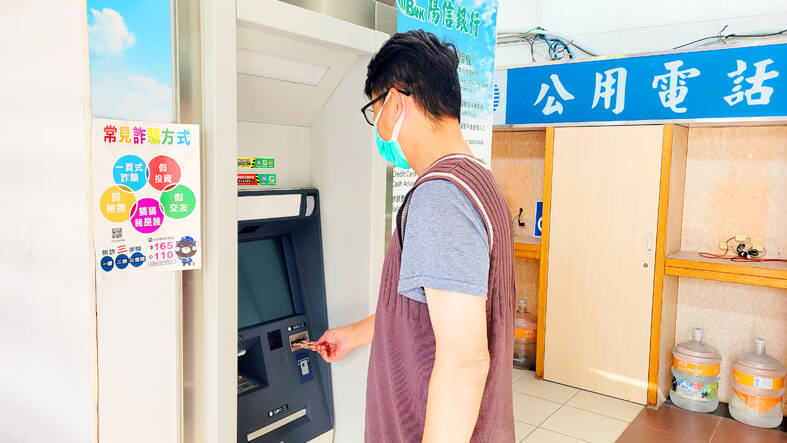Tainan will launch a pilot program starting next month that uses AI-driven face identification technology at automatic teller machines (ATMs) where money mules withdraw money to bolster ATM fraud prevention, Mayor Huang Wei-che (黃偉哲) said on Tuesday.
Money mules hired by fraud gangs often use masks and motorcycle helmets to disguise themselves while making withdrawals or carrying out ATM transactions, Huang said.
However, individuals are not required by law to show their full faces while making withdrawals, said Meng Chih-cheng (蒙志成), head of Tainan’s Research, Development and Evaluation Commission, creating a loophole that fraud rings have exploited.

Photo: Wang Chu-hsiu, Taipei Times
To get around that, the pilot face recognition system to be installed at select ATM locations would first “remind” people using a voice recording to take off their masks and helmets as it tries to identify the user, Huang said.
If after 10 to 15 seconds the system still cannot identify the user, an alarm would sound that might draw the attention of people nearby or bank staff to deter money mules from engaging in transactions, Huang said.
The system would not prevent people from going through with transactions even if a face cannot be identified, Huang said, but he hoped it would have a deterrent effect.

Taiwan is stepping up plans to create self-sufficient supply chains for combat drones and increase foreign orders from the US to counter China’s numerical superiority, a defense official said on Saturday. Commenting on condition of anonymity, the official said the nation’s armed forces are in agreement with US Admiral Samuel Paparo’s assessment that Taiwan’s military must be prepared to turn the nation’s waters into a “hellscape” for the Chinese People’s Liberation Army (PLA). Paparo, the commander of the US Indo-Pacific Command, reiterated the concept during a Congressional hearing in Washington on Wednesday. He first coined the term in a security conference last

Prosecutors today declined to say who was questioned regarding alleged forgery on petitions to recall Democratic Progressive Party (DPP) legislators, after Chinese-language media earlier reported that members of the Chinese Nationalist Party (KMT) Youth League were brought in for questioning. The Ministry of Justice Investigation Bureau confirmed that two people had been questioned, but did not disclose any further information about the ongoing investigation. KMT Youth League members Lee Hsiao-liang (李孝亮) and Liu Szu-yin (劉思吟) — who are leading the effort to recall DPP caucus chief executive Rosalia Wu (吳思瑤) and Legislator Wu Pei-yi (吳沛憶) — both posted on Facebook saying: “I

The Ministry of Economic Affairs has fined Taobao NT$1.2 million (US$36,912) for advertisements that exceed its approved business scope, requiring the Chinese e-commerce platform to make corrections in the first half of this year or its license may be revoked. Lawmakers have called for stricter enforcement of Chinese e-commerce platforms and measures to prevent China from laundering its goods through Taiwan in response to US President Donald Trump’s heavy tariffs on China. The Legislative Yuan’s Finance Committee met today to discuss policies to prevent China from dumping goods in Taiwan, inviting government agencies to report. Democratic Progressive Party Legislator Kuo Kuo-wen (郭國文) said

Sung Chien-liang (宋建樑), who led efforts to recall Democratic Progressive Party (DPP) Legislator Lee Kun-cheng (李坤城), was released on bail of NT$80,000 today amid outcry over his decision to wear a Nazi armband to questioning the night before. Sung arrived at the New Taipei District Prosecutors’ Office for questioning in a recall petition forgery case last night wearing a red armband bearing a swastika, carrying a copy of Adolf Hitler’s Mein Kampf and giving a Nazi salute. Sung left the building at 1:15am without the armband and covering the book with his coat. Lee said today that this is a serious